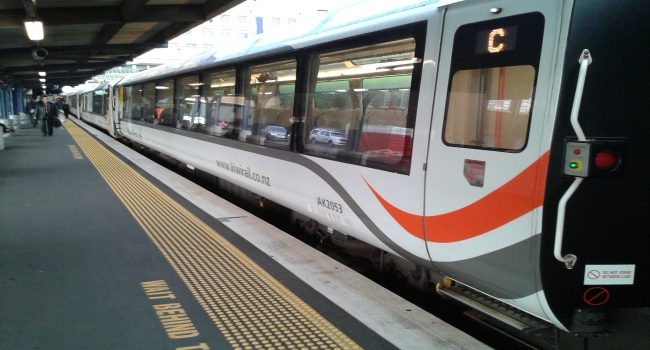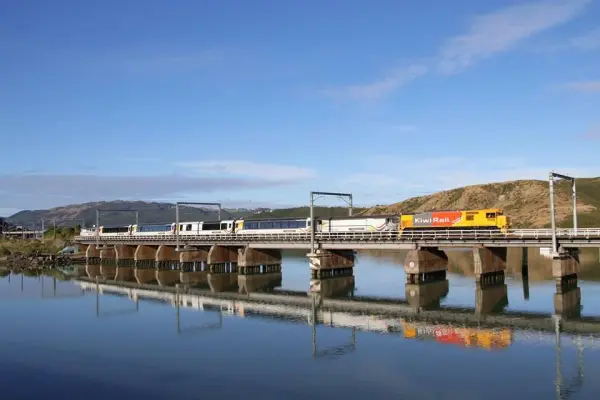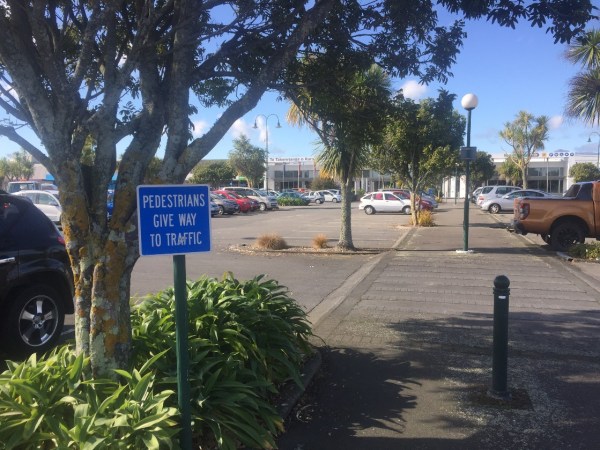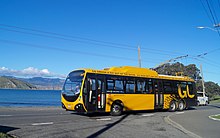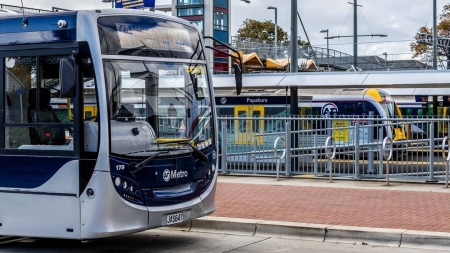Opinion - Richard Peat, the founder of Aotearoa Rural Rail / Rerewhenua ā-rohe o Aotearoa, examines reasons why Aotearoa New Zealand's national rail network needs to be reformed to meet the country's net zero emissions.
The world of railway technologies, its support systems and operational practices are increasingly complex and like all transport modes face a future of traditional marketplace diversification and business competition. In this consistently shifting environment it is inconceivable that a single SOE (State Owned Enterprise) body can daily be hands-on every nuance and market opportunity over the broad spectrum of diverse in-house business disciplines.
Within KiwiRail Holdings Ltd such speciality currently embraces freight train operations, two regional commuter trains, three “Grand Journey” tourist passenger trains, shipping, railway engineering, infrastructure & safety standards, network access command & control, civil engineering, plus, the sales & marketing of all its freight & passenger trains and ferry operations.
Frequent reports in the public domain illustrate succinctly that the grand scale of KiwiRail’s universe impedes its performance. Evidentially, as often disclosed in the media there are too many operational conflicts of interest for it to optimise its deliverables. Such discord prolongs policy implementation, consolidates in-house rivalries, obscures priorities, and provokes cost escalations.
The continuance of this status quo following the announcement of the NZ$1.3b Rail Network Investment Plan “RNIP” warrants therefore a forensic analysis of KiwiRail’s value-for-money. Its efficiency, effectiveness and the return on investment to the government and the people of Aotearoa New Zealand.
There can be both private and public usage of the Aotearoa New Zealand rail network however the superintendence of that national asset is judiciously best served embedded within a State institution that’s completely set apart from any train operating company.
An independent body distanced from those companies should adjudicate on how the network is used, by whom and at what cost, time and frequency. Furthermore the decisions to close, mothball, regenerate or indeed to build new lines must also reside within that independent body. Such a congruous framework already exists: Waka Kotahi New Zealand Transport Agency.
The disciplines and skills sets required to optimise performance, assets and revenues are completely different between freight and passenger rail fleets. People moving and heavy haulage are not compatible bedfellows.
The history of Aotearoa New Zealand railways bears that out and there is plenty of evidence elsewhere in the railway world today that demonstrates that it is wise to establish these two prime rail activities under distinct independent corporate ventures. Across the globe, apart from one-party dictatorial states, train operating companies are not in charge of establishing or policing rail safety and standards policy, or adjudicating on harmful or hazardous incidents on the network and its interface with other transport users and the general public.
The security, resilience and durability of the network are most effectively protected and served by independent professionals with no material or financial interest in train operating companies; suffice from creating and setting those safety critical practices and standards. That’s the key to reducing down the seriousness and number of such events and ensuring that all parties are aware of their responsibilities and liabilities.
Furthermore train operating companies have absolutely no vocation running their own shipping fleets. For evidence of this on short sea crossings similar to the Cook Strait one only has to look at the decades of operational history of railway SOE’s and their ferries on the English Channel despite year on year investments in new vessels and subsidies sailing from France, Belgium, Holland and Denmark to the English ports.
As ferry operators, every railway manager and boardroom director failed: BR with “Sealink” (sold 1984) SNCF with “SeaFrance” (liquidated 2012) Belgium’s SNCB with “Oostende Lines” (sold 1997) and the Dutch NR with their SMZ ferries “Stoomvaart Maatschappij Zealand” (sold 1968.) All had captive audiences, growth tourist and freight markets and yet failed to make a profitable sustainable stand-alone enterprise. All had their vessels thereafter acquired by private ferry companies who continue to sail profitably the same and new crossings despite the latter vigorous competition from the Eurostar “passenger-car-lorry” trains through the channel tunnel.
The same is true across the Mediterranean Sea where the nationalized railways of Spain, France, Greece and Italy (it has one exception that being the Strait of Messina at 3kms wide which is to be replaced by a road/rail bridge, the green light given on April 22nd 2021) all have for decades no longer retained their SOE’s ferry operations and all routes are now in private operators hands. Aotearoa New Zealand must not continue to live in the past and operate state owned ferries.
Given all the aforementioned is it not prudent now that Government has introduced its first RNIP to immediately validate and verify that those who are summoned to discharge this investment are indeed the best assembled to do so. In support of this contention I cite just one example of many that can be found.
KiwiRail’s CEO’s Greg Miller proclamation that it will cost NZ$200m to open the line from Wairoa to Gisborne; a +3x cost explosion flying in the face of the recent BERL report’s costings to reopen the line. When asked to release his research findings CEO Miller refused to share his evidence. As a public servant this lack of transparency is totally unacceptable. Or the NAL regeneration with concrete sleepers (high fossil fuel embedded energy mass in production & end of life disposal) instead of hybrid polymer 100% recycled & recyclable plastic “Lankhorst” sleepers: 25 and 35 tonne axle load with a 50 year design life.
KiwiRail is an uncompetitive and unimaginative SOE that is not in the nation’s best interest. The decarbonization of the whole public transport modal, its products, services and supply chain is a key driver in lowering emissions for Aotearoa New Zealand to achieve it’s Kyoto promises.
An organization only becomes effective and efficient when there exists a political will and business infrastructure conducive to adaptation. Capable thereof to respond in a timely manner to maximize opportunity and markets. On evidence the present structure of the conglomerate KiwiRail is certainly not geared to do that.
A reform of KiwiRail both “on-rail & below the rail” is paramount to the future development of an environmentally sustainable, competitive, and prosperous “industry-of-rail” across the whole of Aotearoa New Zealand.
With proficiencies adapted from established “best practice” worldwide a cogent path forward for NZGov to optimise its railway investment - the tax payer revenues - would be to dismember KiwiRail. A proposal to Ministers:
1. Give responsibility to Waka Kotahi New Zealand Transport Agency for the commercialization and growth of an “Open Access” network. To specify the tariffs to enterprises wishing to operate freight or passenger trains across the entire Aotearoa New Zealand rail network.
2. Construct a new specifically branded SOE business group responsible for all railway infrastructure engineering given to it by Waka Kotahi New Zealand Transport Agency. That group may undertaken the work themselves or subcontract - whichever produces the best return on investment.
3. Establish an independent Rail Safety & Standards Board - there already exist synergies to have this critical function performed within Waka Kotahi New Zealand Transport Agency.
4. Allow KiwiRail to continue operate as a rail freight haulage company either as an SOE or a private business in competition with other freight privateers..
5. Sell KiwiRail’s tourist train business to another private enterprise. For example ROVOS, SA or P&O would be ideal candidates and there are many others out there.
6. Initiate an employee buy-out of the railway workshops and let them sell their locomotive and rolling stock engineering skill sets to all train operators and other industries.
7. Sell off KiwiRail’s “InterIsland” ferry business to an established ferry operator for example to DFDS or A.N.Other to create a truly competitive single playing field across the Cook Strait which will be to the benefit of all potential users - corporate or retail.
In summary focus expertise precisely where it is demanded and not diluted across a vast SOE. This is the only way to maximize the best primary asset a business has, its human resource, and, to secure the strictest fiscal audit of value vis-a-vié expenditure.
A restructure of the nation’s sole railway agency of this magnitude will not only be fiercely resisted by the incumbent SOE but also within the corridors of political parties, government ministers and possibly by trade unions. However the health, vitality and expansion of Aotearoa New Zealand’s railway is a key building block to the growth of the economy, social cohesion and well being.
Reforms along the lines of the above proposed rail reorganization will drive increased private sector business enterprise and new employment opportunities deep into Aotearoa New Zealand’s rural regions on both Te Ika-a-Māui (North Island) and Te Waipounamu (South Island) where presently there is little or worse still, no engagement with the railway industry.
An opinion by Richard Peat, the founder of Aotearoa Rural Rail / Rerewhenua ā-rohe o Aotearoa
For further information concerning the points raised in this opinion -
- Time for a new regional passenger rail network
- Its time for a national public transport network
- New Zealand's National Public Transport Authority
- Light Rail for Branch Lines
- Connecting Communities Initiative
- New Zealand's shrinking passenger railway network
- Why does public transport suck in New Zealand
- Future of long distance passenger rail services in New Zealand
